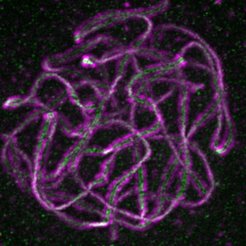Mercier: Causes and consequences of aneuploidy
This project will be supervised by Raphael Mercier at the Max Planck Institute for Plant Breeding Research
Abstract:
Aneuploidy, the presence of one or several additional chromosomes in the karyotype, affect development in many eukaryotes, including human and plants. Meiosis is central in eukaryote reproduction, as it reduces and distributes the set of chromosomes in the gametes. Meiotic defects are a major source of aneuploidy, and in return, the presence of an extra chromosome disturbs the meiotic process. The project aims to use a high throughput approach based on genomics to detect aneuploids, understand their origin, and study their consequences on development and reproduction, in the model plant Arabidopsis thaliana. The project is organized into four complementary parts: (i) Analyze the effect of meiotic missegregation on the karyotype of progeny. Have males and females the same propension to generate aneuploids? Have all chromosomes the same capacity to be trisomic? etc. (ii) Analyze the effect of different aneuploidies on growth and development. (iii) Analyses the effect of the presence of an extra-chromosome on meiosis, notably on chromosome pairing, recombination, and segregation, using both genetic and cytological tools; (iv) Conduct a forward genetic screen, and downstream functional studies, to decipher the mechanisms of karyotype instability.
Group homepage: https://www.mpipz.mpg.de/mercier
Key publication: Durand S, Lian Q, Jing J, Ernst M, Grelon M, Zwicker D, Mercier R. Joint control of meiotic crossover patterning by the synaptonemal complex and HEI10 dosage. Nat Commun. 2022 Oct 12;13(1):5999. doi: https://doi.org/10.1038/s41467-022-33472-w

